英语语音PPT10-3. English Intonation III
English-intonation-英语语调说课讲解

01. 02.
03. 04.
05.
Tone Unit
Nucleus
Most important word in a sentence or a tone unit (Stressed syllable of the last prominent word).
2)The Government of South Africa/ said the Zambian President /has grossly neglected the incidence of AIDS.
Those who sold quickly made a profit.
1)Those who sold quickly /made a profit. 2)Those who sold /quickly made a profit.
Rising
Contrast; Implicational; Correcting mistakes; Warnings; apology
The Fall-rise tone is used in the following types of sentences and situations:
1) He'll 'come on ∨Wednesday, but 'not on Friday. 2) A: Do you smoke?
Head Nucleus
Prehead
We think so.
Prehead Necleus Tail
'English is a global language.
Tail
Head
Nucleus Tail
英语语音语调基础PPT课件
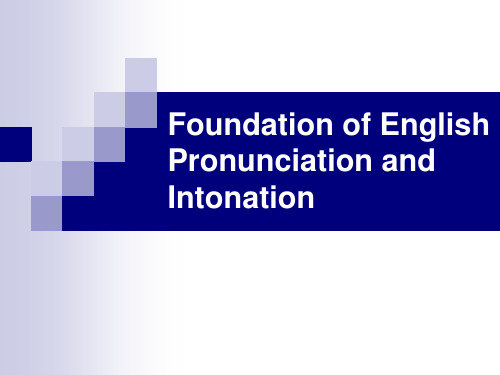
Vowel shape and vowel position
13
English vowel sounds
14
IV. English Intonation
Major intonational concepts 1. Syllable 2. Stress 3. Intonation
15
1. Syllable
A syllable must have a nucleus/peak, which is usually the task of a vowel. Exceptions are some consonants [l, m, n] as in “table, bottom, cotton”.
Syllable Structure
5
Pharyngeal Cavity
Pharyngeal cavity
6
Position of the vocal folds: VOICELESS When the vocal folds are apart, the air
can pass through easily without vibration and the sound produced is voiceless.
solidity analysis vs. analytic 6. The day is beautiful, isn’t it?
3
Question: The English suffix -er can be added to some place names but not to some other place names.
Question: Do one-syllable words have stress? Why or why not?
英语语音课件---Unit13 Types of Intonation in English

Types of English Intonation
Intonation: Why? Falling Tone Rising Tone Fall-rise Tone
2
Intonation: Why?
A. It shows the relationship of words within and between sentences;
3. Is it somebody's ↗ birthday?
It's ↘ house-warming.
4. Will we need to ↗ bring something?
A bottle of ↘ wine will do.
5. Do we need a big ↗ cake?
That would be ↘ great.
We're having a party on Tuesday.
16. Will Wednesday be OK?
I have homework to do on Wednesday.
17. Let's make it Thursday then?
I have an evening class on Tuesday.
Of course.
17
Mark out the tones of the following sentences.
1. Is Gloria coming to ↗ night?
I'm not ↘ sure.
2. Is there anything ↗ special?
It's a large ↘ party.
11
Falling tone Questions and responses
ENGLISH PRONUNCIATION 英语发音学习PPT课件
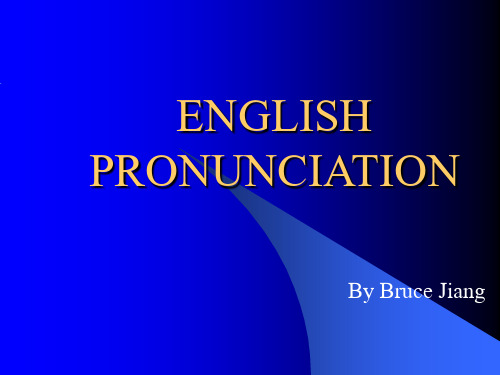
Examples: ill sit miss city
lady silly silk kid
[I] v.s.[i:]
Ship--sheep slip—sleep this—these lip—leap
Some Troublemakers For Chinese
5. [e]
Examples: egg desk many pen dead head
end lend tend
Sentence Drill
The eggs he sells are better than everybody else sells.
ENGLISH PRONUNCIATION
By Bruce Jiang
Wrong Ideas About Pronunciation
Pronunciation is the least important skill in the second language acquisition.
Pronunciation must be good if only one mimics as much as possible.
Some Troublemakers For Chinese
4. [u]
Example: look push good foot cook
woman wood bush hook should
Rule:When “oo” occurs before [k] and [d], “oo” will be read as [u] except “food” and “foot”.
英语语音完整整套教学课件
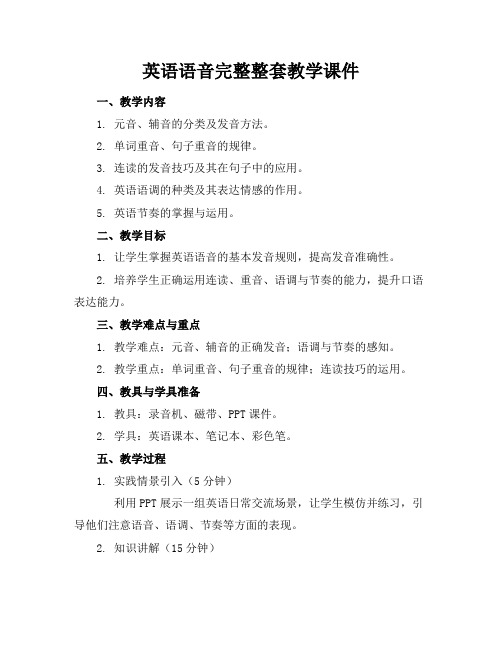
英语语音完整整套教学课件一、教学内容1. 元音、辅音的分类及发音方法。
2. 单词重音、句子重音的规律。
3. 连读的发音技巧及其在句子中的应用。
4. 英语语调的种类及其表达情感的作用。
5. 英语节奏的掌握与运用。
二、教学目标1. 让学生掌握英语语音的基本发音规则,提高发音准确性。
2. 培养学生正确运用连读、重音、语调与节奏的能力,提升口语表达能力。
三、教学难点与重点1. 教学难点:元音、辅音的正确发音;语调与节奏的感知。
2. 教学重点:单词重音、句子重音的规律;连读技巧的运用。
四、教具与学具准备1. 教具:录音机、磁带、PPT课件。
2. 学具:英语课本、笔记本、彩色笔。
五、教学过程1. 实践情景引入(5分钟)利用PPT展示一组英语日常交流场景,让学生模仿并练习,引导他们注意语音、语调、节奏等方面的表现。
2. 知识讲解(15分钟)① 元音、辅音发音规则:通过录音机播放标准发音,让学生跟读并模仿。
② 单词重音、句子重音:结合课本例句,讲解重音规律,进行示范与练习。
③ 连读技巧:以实际例句为例,讲解连读方法,让学生模仿并练习。
④ 语调与节奏:播放英语对话录音,引导学生感知不同语调与节奏的表达效果。
3. 例题讲解(10分钟)选择具有代表性的例题,对语音知识点进行巩固。
4. 随堂练习(10分钟)① 让学生朗读单词、句子,检查发音准确性。
② 模拟实际场景,进行角色扮演,练习语音、语调、节奏。
5. 互动环节(10分钟)六、板书设计1. English Pronunciation2. 内容:① 元音、辅音发音规则② 单词重音、句子重音规律③ 连读技巧④ 语调与节奏感知七、作业设计1. 作业题目:① 复习元音、辅音发音规则,整理笔记。
② 根据所学知识,朗读下列句子,注意重音、连读、语调与节奏:I can't believe it's already five o'clock.The sun is shining brightly outside.They have been working on this project for overa month.③ 自选一段英语对话,进行角色扮演,录音后提交。
英语语音完整版课件
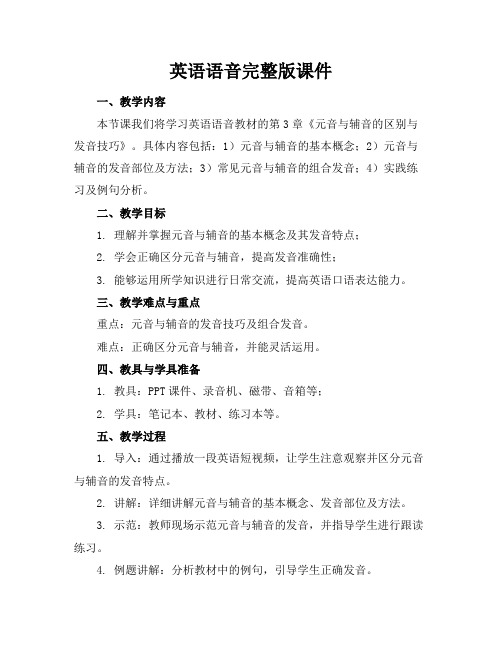
英语语音完整版课件一、教学内容本节课我们将学习英语语音教材的第3章《元音与辅音的区别与发音技巧》。
具体内容包括:1)元音与辅音的基本概念;2)元音与辅音的发音部位及方法;3)常见元音与辅音的组合发音;4)实践练习及例句分析。
二、教学目标1. 理解并掌握元音与辅音的基本概念及其发音特点;2. 学会正确区分元音与辅音,提高发音准确性;3. 能够运用所学知识进行日常交流,提高英语口语表达能力。
三、教学难点与重点重点:元音与辅音的发音技巧及组合发音。
难点:正确区分元音与辅音,并能灵活运用。
四、教具与学具准备1. 教具:PPT课件、录音机、磁带、音箱等;2. 学具:笔记本、教材、练习本等。
五、教学过程1. 导入:通过播放一段英语短视频,让学生注意观察并区分元音与辅音的发音特点。
2. 讲解:详细讲解元音与辅音的基本概念、发音部位及方法。
3. 示范:教师现场示范元音与辅音的发音,并指导学生进行跟读练习。
4. 例题讲解:分析教材中的例句,引导学生正确发音。
5. 随堂练习:让学生分组进行元音与辅音的发音练习,互相纠正,提高发音准确性。
6. 互动环节:设置一些有趣的口语练习,让学生在实际交流中运用所学知识。
六、板书设计1. 英语语音第3章元音与辅音的区别与发音技巧2. 主要内容:a. 元音与辅音的概念b. 发音部位及方法c. 常见元音与辅音的组合发音d. 口语练习及例句七、作业设计1. 作业题目:a. 请列举5个元音和5个辅音,并分别用例句进行说明。
b. 录制一段自己的英语口语表达,注意元音与辅音的发音准确性。
2. 答案:a. 例子:元音[i:](如:see)、[e](如:bed)、[æ](如:cat)、[ɑ:](如:father)、[ɔ:](如:call);辅音[p](如:pat)、[b](如:bat)、[t](如:time)、[d](如:date)、[k](如:cat)。
b. 略。
八、课后反思及拓展延伸1. 反思:关注学生在课堂上的表现,针对发音不准确的问题进行个别辅导,提高教学效果。
英语语音教学ppt课件

[][][][] 半元音: [][]
21
英语基本音素的发音要领和技巧的学习
22
[i:] 的发音要领及字母组合
发音时舌尖抵下齿,舌前部抬高, 口型扁平,成微笑形。音长。
cheese, we,feed,see, three, weekend, queen, CD
要领: 收唇,前撅,收小,略外翻。‘嘘’
声口型。 前趋唇音:
[][][][][][][][], 等。
9
英语发音的三种主要舌位
上舌位 中舌位 下舌位 英语的元音是靠舌根的运动来发音的,
属于舌根音。同时,舌部具有三种发音 位置:上舌位,中舌位和下舌位。掌握 好这三种舌位及舌根的运动才能发好, 发准英语的元音。
发音时,嘴唇较之发大音时要收小,不能有大 动作。要用后部发音法发音。用舌根在口腔后 部做小动作来发音。如:
us, up, love, sit, it, big, head, ten, letter,
book, good, look, 等。
19
元音音标:传统(20)新(24)
短元音:( []/[]) [] [] [][][] [u]/[])
bed, red, pet, wet, then, yes,, mess, desk, ten, instead, headache,, sweater, test, pen, seven, spell, telephone
again, elephant, clever, yellow, welcome
圆唇音: [ ] [:] [:] [][] []等。
7
扁唇(Spread lips)- 外延口型
《英语语音教学》课件

3
Rhythm and Timing
Discover the rhythmic patterns and timing of English pronunciation.
Common Pronunciation Mistakes
1 Confusing Sounds
Identify common sound confusions for non-native speakers and how to overcome them.
2 Difficult Sounds
Explore challenging sounds in English pronunciation and effective techniques to master them
3 Tips and Strategies
Discover useful tips and strategies to improve overall English pronunciation.
Homophones and Minimal Pairs
Explore the concept of homophones and minimal pairs in English phonetics.
English Pronunciation Rules
1
Stress and Intonation
Teaching English Phonetics
Approaches and Methods
Explore different approaches and methods for teaching English phonetics effectively.
Classroom Activities
Intonation语言学演讲 PPT

( 1 )调冠:句子中第一个重读音节之前的非重 读音节. 如:
There’s plenty of time ( there’s ) It’s nearly the same ( it’s ) ( 2 )调尾:指调心之后的所有音节,分为声调 调尾与降调调尾. 如: I think so ( so ) Where is it? ( is it ) ( 3 )调头:是句子中的第一个重读音节。如:
What are the types of intonation?
• Falling • Rising • Falling-rising
1)Falling降调
Use falling intonation for definite and complete information.
表示完整和确定,主要用在:陈述句、特殊 疑问句、祈使句、感叹句。
置。
• 图示:
●••
●••
●
•••
••
To sum up:
• The English intonation of an English sentence containing a number of level tones takes the form of a slowly descending series of stressed syllables interspersed with unstressed ones.
键词重读音节之间的非重读音节的音高,和前面一个重读音节的音高
相同 ). • (4) all syllables before the first important word are
英语语音ppt课件

05
Common problems and solutions
The problem of clear promotion
01
Summary words
unclear, pronunciation not standard
02
Detailed description
Some learners may not be able to understand the content they
express due to unclear pronunciation.
03
Solution
Improve pronunciation clarity by imitating the pronunciation of
Consistent Pronunciation and Practice
/J/as in "jet" /K/as in "kit" /L/as in "leg"
Consistent Pronunciation and Practice
01
/M/as in "mat"
02
/N/as in "net"
04
/Ou/as in "out"
Consistent Pronunciation and Practice
• General Rules: The consonant alphabet includes 21 consonants (/b/,/c/,/d/,/f/,/g/,/h/,/j/,/k/,/l/,/m/,/n/,/p/,/q/,/r/,/s/,/t/,/v/,/w/,/x/,/y/,/z/) General rules state that the consultants are promoting as follows
英语语音PPT10-3.EnglishIntonationIII
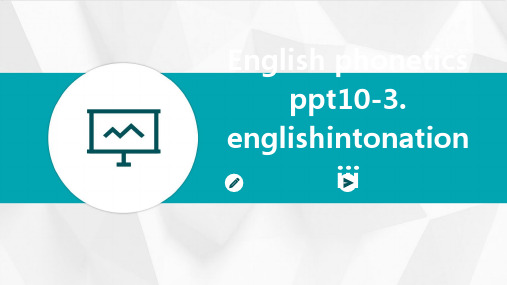
Pitch variations are used to indicate different presence types and suggest emotional expressions
Rhythm refers to the regular pattern of stressed and unstressed syntax in English speech
In declarative intentions, the pitch of the voice commonly falls at the end of the presence, indicating a statement or fact
Stress is often placed on key words or phrases to convey important information or emotional emphasis
Mastering the correct introduction has a significant impact on improving oral expression ability 01 Correct introduction can enhance the clarity
and intelligence of speech, making it easier for listeners to understand
English introduction is characterized by a combination of
pitch, stress, and rhythm
Stress is placed on certain words or phrases to emphasize their
英语语调(Englishintonation)
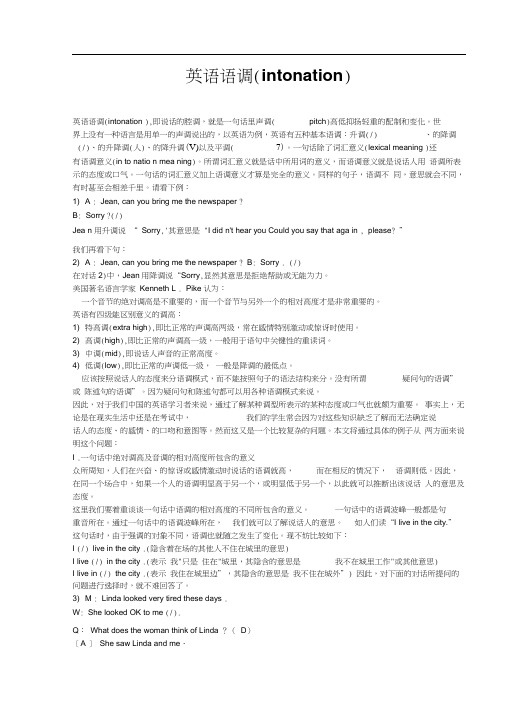
英语语调(intonation)英语语调(intonation ),即说话的腔调,就是一句话里声调( pitch)高低抑扬轻重的配制和变化。
世界上没有一种语言是用单一的声调说出的,以英语为例,英语有五种基本语调:升调(/) 、的降调(/)、的升降调(人)、的降升调(V)以及平调( 7)。
一句话除了词汇意义(lexical meaning )还有语调意义(in to natio n mea ning)。
所谓词汇意义就是话中所用词的意义,而语调意义就是说话人用语调所表示的态度或口气。
一句话的词汇意义加上语调意义才算是完全的意义。
同样的句子,语调不同,意思就会不同,有时甚至会相差千里。
请看下例:1) A : Jean, can you bring me the newspaper ?B: Sorry ?(/)Jea n 用升调说“ Sorry,'其意思是 "I did n't hear you Could you say that aga in , please? ”我们再看下句:2) A : Jean, can you bring me the newspaper ? B: Sorry . (/)在对话2)中,Jean用降调说“Sorry,显然其意思是拒绝帮助或无能为力。
美国著名语言学家Kenneth L . Pike认为:一个音节的绝对调高是不重要的,而一个音节与另外一个的相对高度才是非常重要的。
英语有四级能区别意义的调高:1) 特高调(extra high),即比正常的声调高两级,常在感情特别激动或惊讶时使用。
2) 高调(high),即比正常的声调高一级,一般用于语句中关键性的重读词。
3) 中调(mid),即说话人声音的正常高度。
4) 低调(low),即比正常的声调低一级,一般是降调的最低点。
应该按照说话人的态度来分语调模式,而不能按照句子的语法结构来分。
没有所谓疑问句的语调”或陈述句的语调”。
英语语音教学课件PPT课件
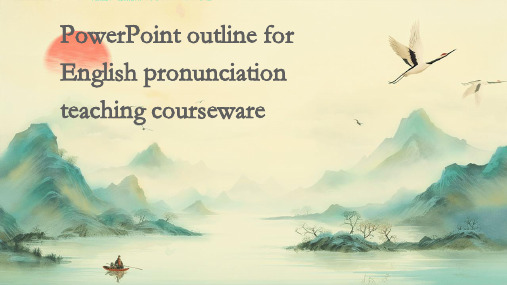
04
Practical Phonetic Practice
Daily language practice
• Summary: Daily language practice is essential for students to improve their English promotion It involves activities such as reading alone, receiving, and speaking in English every day
• Importance of introduction and rhythm: property use of introduction and rhythm can enhance the meaning and emotional impact of communication, making it more natural and authentic
• Advanced promotion skills: This section will focus on more advanced promotion skills, such as connected speech, elision, and assessment
• Practical speaking tasks: This section will provide a variety of speaking tasks for students to practice their promotion skills in different contexts, including role plays, simulations, and real life scenarios
小学英语语音教学(共17张PPT)

◆ Say the sound in a word. 说含有这个音的单词。
◆ Contrast it with other sounds.
与其它的发音相对照、比较差异。
◆Say the sound in meaningful context. 在有意义的情境或上下文中说这个音
小学生学习语音的最基本方法:
3.尤其是对于起始阶段的学生来说,语 音教学对学生以后的英语学习意义 重大。
二、小学英语语音教学的目标和要求
正确读出26个
英文字母
1
《小学英语新课标》 中对语音教学的要求
5
了解英语语音 包括连读、节 奏、停顿、语
调等现象。
The National English
Curriculum
2
了解简单的拼读 规律
音标词汇归类的音标教学Phonetic Symbols
Alphabet
语音的学习就是帮助学生解决英文音音形标不一的问题,提高学生读、记英语单词的能力。
sheep---I want a sheep for my birthday.
字母
◆ Explain how to make the sound.
◆ Say the sound in a word.
正确读出26个英文字母
Phonetic Teaching
语音的学习要和听、说的训练有机结合。
Content 游戏开始后,由一人念R一h个y单th词m,两组学生抢摘听到单词的音标。
节奏 这个游戏也可以以小组为单位来进行。
Vocabulary
单词
方法:利用课件出示四只标有字母组合eer、ear、ch、sh的发音小蜜蜂,在它们的下方是不同颜色的花朵,每朵花上都标有单词,各小
英语语音课件 ppt

Linking and pausing
Linking
Linking references to the smooth transition between words in a sentence In English, linking is achieved through coaching, which refers to the blending of sounds and tastes in speech Proper linking can enhance clarity and naturalness in speech
English pronunciation courseware
目录
• Basic knowledge of English phone
• English Phonetic Skills • English Phonetic Practice • Common problems and
solutions
02
Conversations
Provide authentic and practical conversation practice, allowing
learners to engage in role-play activities with native speakers
03
Vocabulary
Extensions
On the other hand, extensions refer to stretching out or Prolonging a swell sound within a syllabus or adding an extra syllabus to a word Extensions are often used to add emphasis or emotion to a word or phrase For example, the word "money" is often promoted as "m-o-n-e-y" with an extension on the swell sound in the collapsible "o"
- 1、下载文档前请自行甄别文档内容的完整性,平台不提供额外的编辑、内容补充、找答案等附加服务。
- 2、"仅部分预览"的文档,不可在线预览部分如存在完整性等问题,可反馈申请退款(可完整预览的文档不适用该条件!)。
- 3、如文档侵犯您的权益,请联系客服反馈,我们会尽快为您处理(人工客服工作时间:9:00-18:30)。
Unit 26 The Intonation of Enumerations and Vocatives 列举事物(点数)与呼语的音调 (p. 141-)
Enumeration: listing or counting things. – items in a series often have a rising or level intonation, and the last item has a falling tone. (e.g. One, two, three, four, five.) or ( One, two, three, four, five.) Vocative: a word or a noun phrase used when addressing someone. 1. If the name begins the utterance – the rising tune is more friendly and polite (e.g. John, be quick.) , but the falling tune is serious and emphasizing something important (e.g. John, be quick.) . A level intonation is also sometimes heard (e.g. John, be quick.) . 2. If the name comes at the end of the utterance – often unstressed. (e.g. Someone’s at the door, ֠Carol.) 3. Sometimes the vocative is on a rising tune after a fall. (e.g. Good after noon, everybody.) More examples and exercises: P. 142-145
Exclamations – falling tune. (e.g. Good heavens!) Apologies – more polite to use falling-rising tune. (e.g. Sorry.) Greetings – rising or falling tune. (e.g. Good or (Good morning.) bye.) Saying goodbye – rising tune. (e.g. Good More examples and exercises: P. 146-150. morning.)
Unit 27 The Intonation of Exclamations, Apologies, Greetings and Leave-takings 惊叹,道歉,见面和告别的句子语调 (p.146-)
Something not very exciting – rising tune. (e.g. you.) Thank
the stressed syllable of the important word (=key word, or content word) the falling tune]
Note: [
Some concepts:
Intonation unit 音调单位: it usually corresponds to a sense group (or word group) . (e.g. – Oh, / do you know one? -- Great! Let’s go.) Elements in an intonation unit The pre-head 调冠: any unstressed syllable or syllables that may precede the head - or the nucleus, if there is no head The head 调头: the part of an intonation unit that extends from the first stressed syllable up to the nucleus The nucleus调核: the stressed syllable of the last content word in an intonation unit The tail 调尾: any syllable or syllables that may follow the nucleus
They
flew to
London. (The nucleus is on the verb: flew.
The speaker wants to highlight how they travelled: They flew to London, not drove to London. )
They
Summary: : The use of English intonation
The falling tone -- indicating `definiteness' and `completeness'. Types of sentences: Complete and definite statements (e.g. The
They
flew
to
London. (The nucleus is on the
preposition: to, which is usually unstressed. The speaker wants to highlight the direction: They flew to London, not from London. )
We are LEARNing a FOReign LANGuage.
P
P = Pre-head
H
H = Head
N
T
N = Nucleus T = Tail
Therefore, the nucleus 调核 is normally the stressed syllable of the last content word in a sentence, such as “LANG” in the above-mentioned sentence.调核通常是句子中最后一个关键词 (实词)的重读音节。 The nucleus is the syllable that carries the tune pattern of the sentence, i.e. the fall, the rise or the fall-rise. 调核是产生升降 调的地方。 But in order to emphasize a word, we can ‘shift’ the nucleus to the stressed syllable of the word we want to emphasize. 调核 可以根据强调信息的需要发生移位。
Unit 25 The Intonation of Reporting Phrases 报导语的音调 (p. 136-)
The definition of reporting phrases: phrases such as “he asked” and “said the other”. 1. Reporting phrases + quoted speech – rising or level tune. (e.g. She was ֠calling, “Have you finished? ” ) 2. Quoted speech + Reporting phrases Quoted speech (if with a falling tune)– reporting phrases (remains on a low level) (e.g. “You can’t come,” he ֠said ֠angrily.) Quoted speech (if with a falling-rising tune or rising tune)– reporting phrases (rising tune) (e.g. “ Are you in a hurry?” she asked. ) More examples and exercises: P.136-139
wait.)
Statements intended to be soothing or encouraging (e.g. I shan’t be long. = I’ll come back soon) Statements intended as questions (e.g. You like it?) Questions showing much interest (e.g. How’s your daughter? ) Repetition questions (e.g. –I arrived at ten o’clock. – When? )
Unit 24-27 The Use of English Intonation (II)
Unit 24 Emphatic Intonation 强调句的音调 (P.132-) Please read the following sentences aloud: They flew to London. They flew to London. They flew to London. They flew to London.
The rising tune - indicating `uncertainty', `incompleteness' or `politeness'. Types of sentences:
Yes-no questions (or general questions) (e.g. Have they gone? ) Incomplete statements (e.g. When he came, I asked him to
